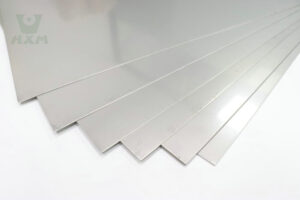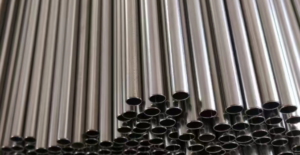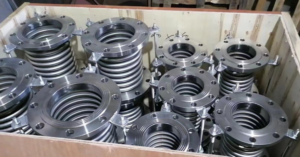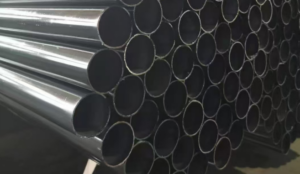High Temperature Alloy GH2132
High Temperature Alloy GH2132 (GH132) is a Fe-25Ni-15Cr based high temperature alloy, strengthened with molybdenum, titanium, aluminium, vanadium and trace boron. Below 650 ℃ has a high yield strength and lasting, creep strength, and has a good processing plasticity and satisfactory welding performance.
Applicable Standards for High Temperature Alloy GH2132
| Product Form | Standard | Description |
|---|---|---|
| GH 2132 Bar and Forgings | AMS 5731 | This standard specifies the requirements for alloy steel bars and forgings. |
| GH 2132 Bar and Forgings | AMS 5732 | Covers the requirements for heat-treated bars and forgings. |
| GH 2132 Bar, Wire, Forgings, Tubing, and Rings | AMS 5737 | Specifies the requirements for alloy materials in various forms including bar, wire, forgings, tubing, and rings. |
| GH 2132 Plate, Sheet, and Strip | ASTM A638 | Standard specification for precipitation hardening iron base superalloy plates, sheets, and strips for high-temperature service. |

Applications of High Temperature Alloy GH2132
Aerospace Industry: High Temperature Alloy GH2132 is extensively used in the aerospace industry for manufacturing jet engine components, turbine blades, and afterburner parts. Its ability to maintain strength and resist oxidation at high temperatures makes it ideal for these applications.
Gas Turbines: Components within gas turbines, such as blades, rings, and casings, can be made from GH2132 due to its high-temperature strength and corrosion resistance, ensuring longevity and reliability under extreme conditions.
Automotive Industry: In high-performance automotive applications, High Temperature Alloy GH2132 is used for manufacturing exhaust parts and turbocharger components, which are exposed to high temperatures and require materials that can maintain their properties under thermal stress.
Fasteners: High Temperature Alloy GH2132 is often used to produce high-temperature fasteners, including bolts, nuts, and screws, used in various industrial applications where high strength and resistance to heat are necessary.
Nuclear Applications: The alloy’s stability and resistance to radiation and corrosion at high temperatures make it suitable for use in nuclear reactors, particularly in non-reactor components subjected to high temperatures.
Petrochemical Industry: In petrochemical plants, High Temperature Alloy GH2132 is used in applications like piping, valves, and reactor components, where materials must withstand corrosive substances and high temperatures.
Industrial Furnaces: Components within industrial furnaces, such as baskets and trays, can be fabricated from GH2132 to exploit its high-temperature strength and oxidation resistance, ensuring durability and performance in harsh thermal environments.
The unique combination of high-temperature strength, oxidation resistance, and corrosion resistance makes GH2132 a preferred material for applications where components are subjected to extreme thermal environments and corrosive conditions.
Chemical composition of High Temperature Alloy GH2132(%)
| Element | Percentage (%) |
|---|---|
| Nickel (Ni) | 24.0 – 27.0 |
| Chromium (Cr) | 13.5 – 16.0 |
| Iron (Fe) | Balance |
| Molybdenum (Mo) | 1.0 – 1.5 |
| Titanium (Ti) | 1.9 – 2.35 |
| Vanadium (V) | 0.1 – 0.5 |
| Aluminum (Al) | 0.35 max |
| Carbon (C) | 0.08 max |
| Manganese (Mn) | 2.0 max |
| Silicon (Si) | 1.0 max |
| Phosphorus (P) | 0.025 max |
| Sulfur (S) | 0.025 max |
| Boron (B) | 0.001 – 0.010 |
Physical properties of High Temperature Alloy GH2132
| Physical Property | Value | Unit |
|---|---|---|
| Density | 7.93 | g/cm³ |
| Melting Point | 1364 – 1424 | °C |
| Specific Heat Capacity | 0.461 | J/g·K |
| Thermal Conductivity | 14.9 | W/m·K |
| Coefficient of Expansion | 16.4 (at 20-100°C) | µm/m·K |
| Electrical Resistivity | 1.29 | µΩ·m |
Mechanical properties of High Temperature Alloy GH2132
| Mechanical Property | Value at Room Temperature | Value at Elevated Temperature (e.g., 650°C) | Unit |
|---|---|---|---|
| Tensile Strength | 850 – 1100 | 550 – 800 | MPa |
| Yield Strength (0.2% Offset) | 550 – 750 | 230 – 550 | MPa |
| Elongation | 25 – 40 | 20 – 30 | % |
| Hardness | 24 – 38 | – | Rockwell C |
Content
FAQs about High Temperature Alloy GH2132
The density of High Temperature Alloy GH2132, also known as Alloy A-286 or UNS S66286, is approximately 7.93 grams per cubic centimeter (g/cm³). This measurement indicates the mass per unit volume of the alloy and is a critical physical property that plays a significant role in the material’s selection and application, especially in industries where weight and material strength are crucial factors.
In the context of aerospace, automotive, and other engineering applications, the relatively high density of GH2132 is a factor to consider when designing components that require a balance between strength and weight. Despite its density, the alloy’s high-temperature strength and corrosion resistance make it a preferred choice for many applications that operate under severe conditions, such as jet engine components, gas turbines, and exhaust systems. The density is also essential for calculating the weight of a given component made from the alloy, which can impact the overall design and efficiency of a system, particularly in aerospace and automotive applications where weight is a critical consideration.
The hardness of High Temperature Alloy GH2132 (Alloy A-286 or UNS S66286) typically ranges from 24 to 38 on the Rockwell C scale (HRC) when the material is in the aged condition. This range reflects the material’s resistance to indentation and provides an indication of its strength and wear resistance.
The specific hardness value within this range can vary depending on the heat treatment and aging process the material has undergone. The aging process, which involves heating the material at a lower temperature after solution treatment, enhances the precipitation of strengthening phases, thereby increasing the hardness.
A hardness of 24 to 38 HRC indicates that GH2132 is a relatively hard material, which contributes to its ability to withstand wear and mechanical stress. This makes it suitable for applications where durability and resistance to surface deformation are critical, such as in aerospace engine components, turbine parts, and fasteners exposed to high temperatures and corrosive environments.
It’s important to note that while hardness is a critical property, the selection of a material for a specific application should also consider other mechanical properties, such as tensile strength, yield strength, and elongation, as well as the material’s corrosion resistance and performance at the intended service temperature.






